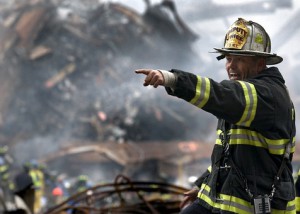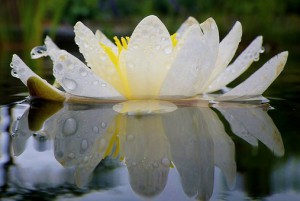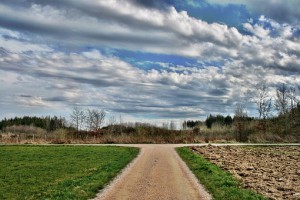Friday
Dharma TeachingsThink About It; Beliefs Matter
A reflection on how our beliefs influence our behavior, our communities, and our ability to live in ways that reflect basic goodness.
by Shastri Christine Heming
 Recently, as I was preparing to teach about the power of kindness, I found myself re-reading many of my most revered books, including A Paradise Built in Hell, by Rebecca Solnit. This book investigates five disasters in depth and tells the stories of those who were there – ordinary people as well as those in positions of power. It is a beautiful testament to the basic goodness that naturally arises in those times of total upheaval, hence the use of the word “paradise” in the title.
Recently, as I was preparing to teach about the power of kindness, I found myself re-reading many of my most revered books, including A Paradise Built in Hell, by Rebecca Solnit. This book investigates five disasters in depth and tells the stories of those who were there – ordinary people as well as those in positions of power. It is a beautiful testament to the basic goodness that naturally arises in those times of total upheaval, hence the use of the word “paradise” in the title.
Peppered throughout the book is the phrase, “Beliefs matter,” echoing a key phrase from Sakyong Mipham Rinpoche’s book The Shambhala Principle. If we don’t believe in basic goodness, what do we believe?
As the Sakyong tells us, “If we hold the belief that humanity has already failed . . . we are surrendering to an underlying belief that humanity is bad. . . . If we have the bravery to proclaim basic goodness and move beyond our doubt about humanity, it will be harder for evil to arise.” Rinpoche also notes that “Tyrants do not arise because humans are by nature evil, but because society does not acknowledge human goodness.”
Beliefs matter.
 Somehow this simple phrase keeps reverberating for me. It is partly that I can see how many beliefs I have, some I’m sure that have yet to come to light and many full of prejudice. It is an interesting exercise to hold this mirror in front of me when I begin to comment on something or listen to someone else. I am full of beliefs.
Somehow this simple phrase keeps reverberating for me. It is partly that I can see how many beliefs I have, some I’m sure that have yet to come to light and many full of prejudice. It is an interesting exercise to hold this mirror in front of me when I begin to comment on something or listen to someone else. I am full of beliefs.
Rebecca Solnit took this phrase from William James who asked the question, “What difference would it practically make to anyone if this notion rather than that notion were true?” As a pragmatist, James was more interested in how our beliefs shape the world, rather than in finding some form of absolute truth. Solnit shows us quite conclusively that in times of crisis when our very survival is challenged, beliefs often are a matter of life and death.
 Beliefs matter. They send young men and women to war and others into slavery. They cause inconceivable suffering. But they also save lives, uplift lives, giving our lives meaning and purpose, a sense of belonging and joy.
Beliefs matter. They send young men and women to war and others into slavery. They cause inconceivable suffering. But they also save lives, uplift lives, giving our lives meaning and purpose, a sense of belonging and joy.
A woman named Dianne Monroe is alive today because her grandparents in Holland took in a young Jewish German girl and raised her as one of their own, as a sister to Dianne’s mother. Years later, Dianne’s parents would hide this woman, her husband and child, as they made their escape from Nazis Germany to England. In doing so, Dianne’s own parents, who were Jewish, gained first hand knowledge of the perils they faced as well as their means of escape.
Dianne grew up with this story. Taking in a young homeless child and later keeping her from harm, had saved the lives of her parents and her own life as well. She writes, “We truly cannot envision the ripple effects of our actions and the impact they can have on the future.”
 Our Sakyong has said on many occasions that humanity is at a crossroads. Every day we witness an array of escalating social, economic and environmental disasters. The list of troubles we face as a planet, as a species, and as a society grows daily. It is overwhelming thinking about how to respond. But on the other hand, it could be as simple as, “Beliefs matter.”
Our Sakyong has said on many occasions that humanity is at a crossroads. Every day we witness an array of escalating social, economic and environmental disasters. The list of troubles we face as a planet, as a species, and as a society grows daily. It is overwhelming thinking about how to respond. But on the other hand, it could be as simple as, “Beliefs matter.”
Sometimes it is quite challenging to believe in basic goodness – it seems an abstract concept, or simply too simple or too good to be true. Each morning the world news seems to confirm the opposite of basic goodness. But here we are; humanity has survived so far, and only because of basic goodness.
How do we wish to shape the world? In light of this question, it seems clear to me that beliefs matter. Even when our conviction in basic goodness wavers and we doubt this fundamental truth, if we take the attitude of basic goodness, if we stop to think “What if it’s true?” — this can profoundly change our view. It can change how we go forward, what we do, how we engage with life.
 The Sakyong encourages us: “We need to take time for self-reflection . . . [and] examine our view. . . . Self-reflection is not something we do just once . . . we need to do it consistently. . . We have to be able to see what is genuine. . . . in the process of reflection, we are unearthing our treasure, and testing our basic goodness over and over again.”
The Sakyong encourages us: “We need to take time for self-reflection . . . [and] examine our view. . . . Self-reflection is not something we do just once . . . we need to do it consistently. . . We have to be able to see what is genuine. . . . in the process of reflection, we are unearthing our treasure, and testing our basic goodness over and over again.”
Let us reflect alone and together on what we believe, which is to say, our view of who we are and how we want to shape the world. Reflection is a simple act with tremendous transformative power. To this end, I find it helpful to reflect again and again on the underlying beliefs that caused me to say certain things, to act in certain ways, or to have certain opinions.
Think about it. Beliefs matter.
Christine Heming lives in the Annapolis Valley, Nova Scotia, with her husband Gregory Heming, an ecologist and municipal councillor. She holds a Ph.D. in speech science and pathology, and for nine years was on the faculty of Dalhousie University, and later the staff of the Annapolis Valley Regional School Board. Now retired, she devotes her time to promoting the principles of Shambhala as a Shastri, or senior teacher. Fostering genuine communication has been a major part of her life’s work. She has a daughter, Carolyn, an artist and advocate for persons with special needs, who currently lives in Iqaluit, Nunavut, Canada. She is also a proud grandmother.
Editor’s note: Shastri Heming teaches a program entitled, ‘The Power of Kindness,” that explores this notion through stories, reflection, dialogue and meditation. The next program is scheduled for April 15-17 at Karme Choling Shambhala Meditation Center in Vermont. For further information go to: https://www.karmecholing.org/program/?id=5587, or log on to Karme Choling’s main web site and click on “Programs.”
Images courtesy of Pixabay





Feb 29, 2016
Reply
David,
Thank you for this post. Living in a rural area, this mutual care is still very much alive.
It may take just one person to start this on their one block. Let it spread naturally then perhaps it will reach the “tipping point.”
Christine
Feb 28, 2016
Reply
Thank you so much for your excellent article. A Paradise Built in Hell, also affected me strongly and sparked a practical idea, which may help us experience the basic goodness of society.
In 1996 a heat wave in Chicago killed over 750 people, mostly the elderly. Studies showed that neighborhoods with strong social cohesion had the lowest death rates. Halifax more recently experienced extreme summer heat during which an elderly bedridden woman with mental challenges who always kept her windows closed died of the heat. I realized that if someone nearby had known of her situation, her life might easily have been saved. And if power went out for a week in a winter cold spell, and everyone’s phones and computers went down, what would the elderly and challenged do?
If neighbors would volunteer to go door-to-door yearly, connecting people who might need assistance during emergencies with those who could offer it, many lives might be saved, and perhaps even more importantly, we could strengthen our communities. It would be wonderful to create a small town feeling of connectivity within each city neighborhood. And how healing to have someone come to the door neither running for office, nor soliciting funds, but offering to strengthen neighborhood ties!
As the Sakyong has said, enlightened society begins with a conversation between two people. If anyone is inspired by this idea, feel free to contact me. Who knows – a spark of this vision could start a fire of beneficial activity.
Feb 27, 2016
Reply
Thank you, Christine. My personal experience of 9/11 in downtown New York was of pure emptiness and compassion. A search for “A Paradise Built in Hell” surfaced a high-school Humanities Curriculum Guide that calls for students to read excerpts of the book and analyze photographs from several major disasters. “Often disasters are the catalyst for citizens to become an active part of their community, helping out their neighbors (even if they are strangers), and giving people an opportunity to be part of something bigger than themselves.” Below is a link to the Curriculum, including a Basic Goodness image of a young girl in the aftermath of the 1906 San Francisco earthquake (page 20):
http://www.calhum.org/files/uploads/grant_related/CR-Curriculum-Guide-Paradise%20Lost%20in%20Hell%20FINAL2.pdf
Feb 27, 2016
Reply
Christine, I very much appreciate your message. In my own practice, I have started intentionally flashing on key words from time to time, realizing that even shamatha practice is infused with my beliefs. If I say “humility, gentleness” to myself occasionally as I practice, it softens me and orients me in the direction I want to go.
Feb 27, 2016
Reply
Yes, beliefs matter. Isn’t that the basis of Buddhist View? View, practice and action. View itself is a practice. The profound difference in Buddhism is that, recognizing we have beliefs, we can then choose them for efficacy rather than identifying with them. The story of the peacock is a good example:
https://sites.google.com/site/channelbuddhism/story-of-the-peacock
So it’s not just about looking at our preconceptions. It’s about consciously using the tool of Buddhist View systematically.
I would also point out that the idea that humanity is at a crossroads is also a belief. Do we really need that belief? There’s a risk of grandiosity in thinking that one is so special as to be present at the Apocalypse. It’s a conceit that many have fallen for in the past. And it’s potentially a grave distraction from actual practice.
Feb 26, 2016
Reply
Katey,
Thank you very much for this. You are so right. We will edit.
Christine
Feb 26, 2016
Reply
Christine thank you for this thoughtful post and invitation to reflect. I’d like to add one thought to your observation that “Beliefs matter. They send young men to war and others into slavery.” Beliefs send young women into war, too. They also send men and women of all ages. I think it’s important to avoid common turns of phrase, such as “send young men to war,” when we’re talking about matters of life and death–and perhaps especially when so many men and women of all ages are currently fighting. Each time we can publicly choose the more accurate words, we invite others to push further away from the myths of “young men at war” and toward the realities of our current military situations.